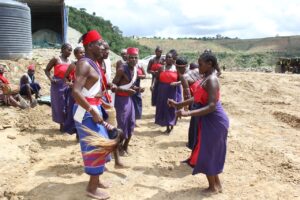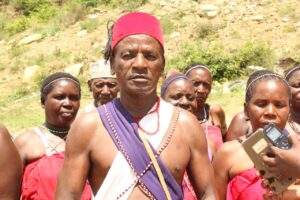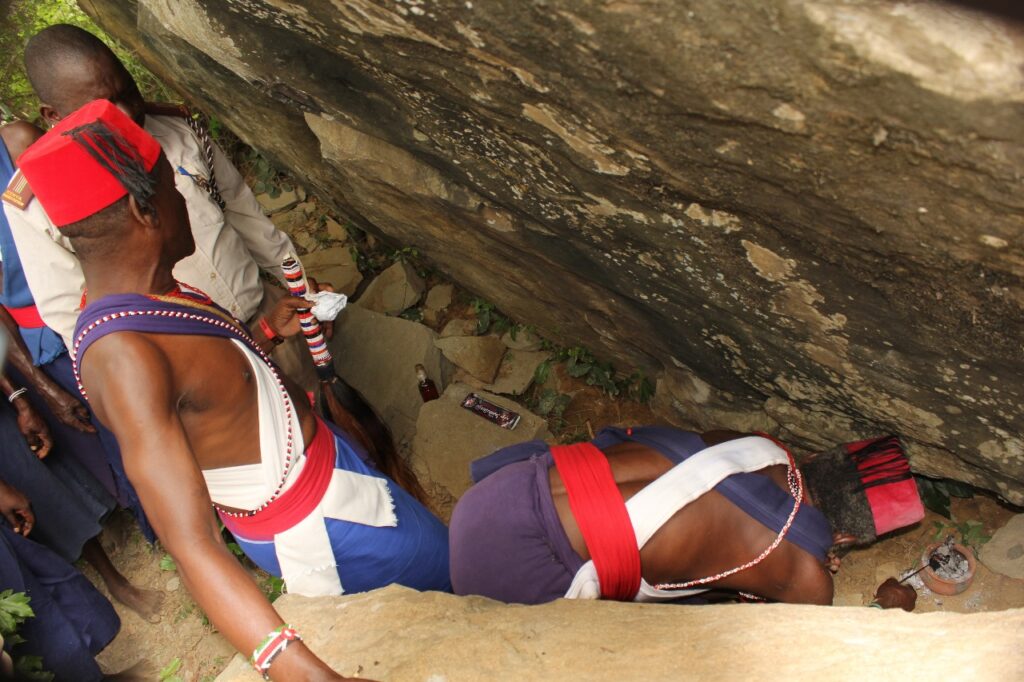By Nuru Salim.
A powerful cultural cleansing ritual was conducted by Kaya elders in Fulugani village, Mavyonini area in Samburu Sub-county as part of a sacred gesture to seek ancestral blessings for the ongoing Mwache Dam construction project.
The ceremony, marked by symbolic sacrifices, ancestral invocations, and deeply rooted rituals comes in the wake of the demolition of kaya shrines that elders traditionally used to conduct their spiritual work.
The elders, though visibly disturbed by the destruction of their sacred sites, chose the path of peace by performing the ritual to cleanse the area and allow construction to proceed without spiritual disruptions.
The elders stressed that the exercise was vital to avoid possible misfortunes like drought, which they believe could arise from spiritual anger.
“We had to come and do this cleansing to appease the spirits on this site so that the project can go on. We accept this project with open hearts because it is happening on our land and we agreed that our youth will benefit through employment. If this doesn’t happen, major catastrophes like drought will be witnessed.’’ said Shaban Vumbe, the leader of the Kaya elders.
Indeed, this project has absorbed youth from all nine Mijikenda tribes some in senior positions, others as junior workers,” Vumbe confirmed.
The cleansing, described by elders as one of the most critical ceremonies in their tradition, involved the sacrifice of a black goat, two black cows, a black sheep, and a chicken.
According to the Kaya elders, these sacrifices symbolizes the transfer of spiritual energy and were meant to neutralize any potential wrath from the spirits angered by the destruction of sacred sites to pave way for the construction.
“If we don’t perform these rituals, workers here will start seeing ghosts that will disturb their construction work. We came here to get rid of those spirits,” Vumbe added.
“Just like in other religions where prayers are answered, we offer sacrifices here so that our needs are met.”
The rituals included traditional dances, rain-invoking songs dubbed ‘vumatiti ndo mvula’, blood sacrifice and the symbolic burial of a clay pot filled with water.
The pot, filled with water and mixed with symbolic leaves was dipped in the ground upright and left uncovered on the opening, represented a spiritual invitation to the ancestors to continue their discussions with the elders in secrecy over the course of seven days, after which the pot is exhumed to signify end to the rituals.
During this time, the area remains restricted, and locals have been advised not to enter the ritual space during the period of seven days.
“This is one of seven similar rituals we’ve conducted in different parts in the surrounding villages” Vumbe revealed.
“After this one, another final ritual will be performed once the entire project is completed in the coming years, of which it will signify success to the project.” He added.
Jemimah Koi, one of them representing the women whose kaya was directly affected by the demolition, expressed mixed feelings about the changes. “We have accepted the project, but the blasting of rocks has driven away sacred animals and disturbed our spiritual balance,” she said.
“Kilometers from this construction area, animals like colobus monkeys, baboons, and vervet monkeys have disappeared, and their numbers have reduced drastically.” She added.
Koi also raised concerns over environmental impacts. “The Mwache River that we used to rely on for clean water is now polluted due to the ongoing construction. Neither people nor livestock can use the water anymore,” she said.
“However, we are grateful for the new road from Vikinduni to Kinango, built through this project. But our biggest remaining plea is for the Mwache Bridge to be rehabilitated, it becomes extremely dangerous while crossing during heavy rains and floods” She lamented.
The elders, while standing firm on preserving their traditions acknowledged the benefits of the dam but also demanded their sacred sites to respected.
The dam, which officially begun its construction in March 2023, is expected to be complete by February 2027.
Once completed, it will supply 186,000 cubic meters of clean water daily to Kwale and Mombasa counties and provide water for irrigation to 1,000 acres, benefiting over 2,000 farmers.


